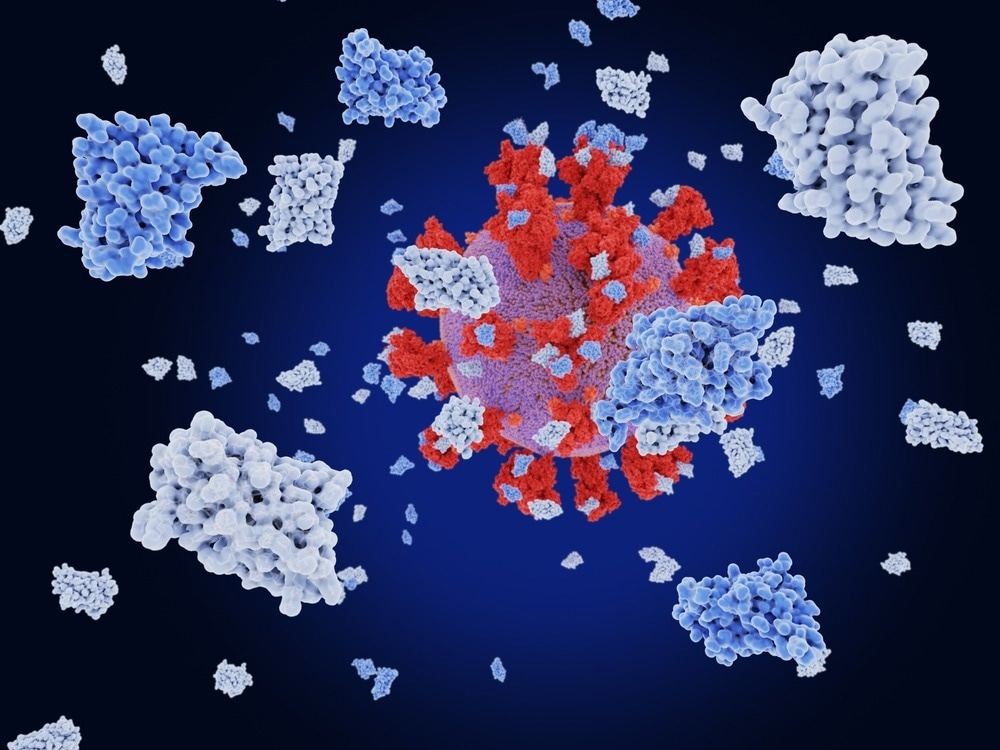In a recent study posted to the bioRxiv* preprint server, researchers demonstrated the production of nanobodies against severe acute respiratory syndrome coronavirus 2 (SARS-CoV-2) spike protein.
 Study: Plant production of high affinity nanobodies that block SARS-CoV-2 spike protein binding with its receptor, human angiotensin converting enzyme. Image Credit: Juan Gaertner/Shutterstock
Study: Plant production of high affinity nanobodies that block SARS-CoV-2 spike protein binding with its receptor, human angiotensin converting enzyme. Image Credit: Juan Gaertner/Shutterstock

 This news article was a review of a preliminary scientific report that had not undergone peer-review at the time of publication. Since its initial publication, the scientific report has now been peer reviewed and accepted for publication in a Scientific Journal. Links to the preliminary and peer-reviewed reports are available in the Sources section at the bottom of this article. View Sources
This news article was a review of a preliminary scientific report that had not undergone peer-review at the time of publication. Since its initial publication, the scientific report has now been peer reviewed and accepted for publication in a Scientific Journal. Links to the preliminary and peer-reviewed reports are available in the Sources section at the bottom of this article. View Sources
Background
SARS-CoV-2 is the causal virus of the coronavirus disease 2019 (COVID-19) pandemic and belongs to the Coronaviridae family. This virus has resulted in widespread mortality and morbidity across the world. While COVID-19 vaccines have limited the transmission of the virus, their waning efficiency has highlighted the urgent need to develop effective and robust treatments against COVID-19.
About the study
In the present study, researchers showed the production of nanobodies® (VHH antibodies) in the plant Nicotiana benthamiana against SARS-CoV-2 spike proteins.
The team designed four constructs for experimentation with the plant expression of COVID-19 nanobodies. The methionine at the start codon of the protein sequence in the SARS-CoV-2 nanobody was removed and replaced with a signal peptide sequence having an N-terminal to facilitate protein secretion. Additionally, a negative mutated control construct was designed such that amino acids present in the three complementarity determining regions, namely cerebellar degeneration-related protein 1 (CDR1), CDR2, and CDR3, of the SARS-CoV-2 nanobody sequence were scrambled to block interactions with the viral spike receptor-binding domain (RBD).
N. benthamiana plants were grown and utilized at four to five weeks old for the transient expression of nanobodies via plant infiltration with Agrobacterium EHA105. The leaves of N. benthamiana plants were studied under ultraviolet (UV) light for green fluorescent protein (GFP) expression and harvested two days post infiltration (dpi). Subsequently, total plant proteins were extracted. Furthermore, the activity of the recombinant nanobodies was verified by performing a competitive enzyme-linked immunosorbent assay (ELISA) that assessed the inhibition of the interaction between the spike RBD and the angiotensin-converting enzyme-2 (ACE2) receptor in the presence of the antibodies.
Results
The study results showed that the initial test conducted with SP-CoV19_his obtained from transient expressing leaves resulted in approximately 15 kDa, thus displaying expression and purification. Furthermore, the GFP visualization of infiltrated leaves exhibited high expression levels two dpi. Competitive ELISA showed that 1µg/mL SP-CoV19_his efficiently inhibited ACE2-RBD interaction.
Similar results were also observed when SP-CoV19_his-GFP and SP-his_CoV19-GFP were employed, showed 100% inhibition of ACE2-RBD interaction at 1µg/mL. Furthermore, the mutated sequence of SP-mCov19_his blocked less than 20% at 1µg/mL and 0% at 0.1µg/mL. This indicated that the plant-produced SP-CoV19_his, SP-CoV19_his-GFP, and SP-his_CoV19-GFP inhibited 100% of the interaction between SARS-CoV-2 RBD and ACE2.
Conclusion
Overall, the study findings demonstrated the feasibility of producing nanobodies in plants that block the interaction between the human ACE2 receptor and the SARS-CoV-2 spike protein RBD, a critical stage in the infection start process. The study described plant-based nanobody synthesis as a cost-effective and scalable alternative for promptly responding to therapeutic interventions for emerging pathogens in human health and agriculture.

 This news article was a review of a preliminary scientific report that had not undergone peer-review at the time of publication. Since its initial publication, the scientific report has now been peer reviewed and accepted for publication in a Scientific Journal. Links to the preliminary and peer-reviewed reports are available in the Sources section at the bottom of this article. View Sources
This news article was a review of a preliminary scientific report that had not undergone peer-review at the time of publication. Since its initial publication, the scientific report has now been peer reviewed and accepted for publication in a Scientific Journal. Links to the preliminary and peer-reviewed reports are available in the Sources section at the bottom of this article. View Sources